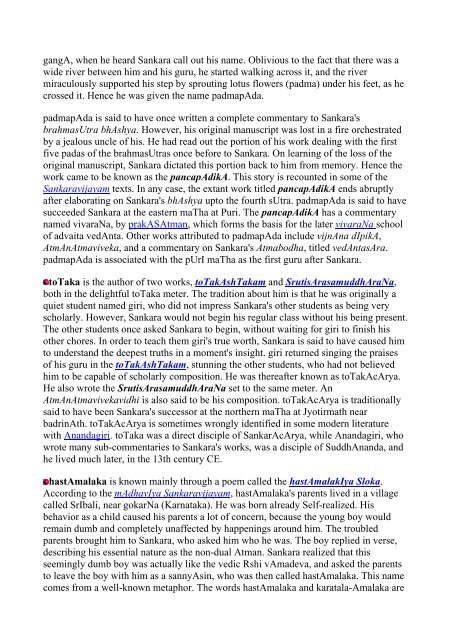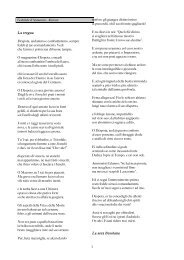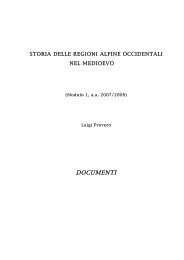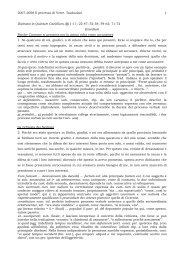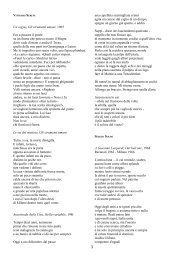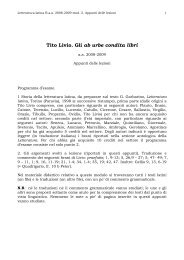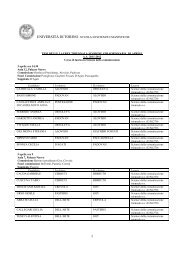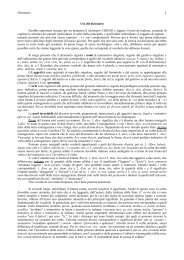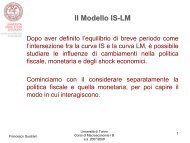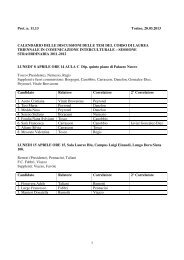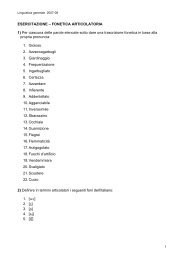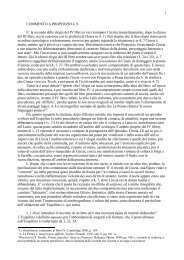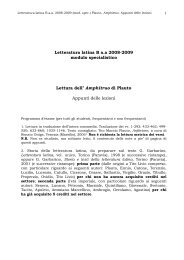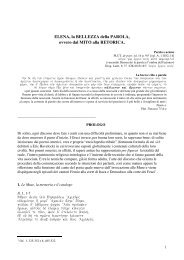ajAti vAda
ajAti vAda
ajAti vAda
You also want an ePaper? Increase the reach of your titles
YUMPU automatically turns print PDFs into web optimized ePapers that Google loves.
gangA, when he heard Sankara call out his name. Oblivious to the fact that there was a<br />
wide river between him and his guru, he started walking across it, and the river<br />
miraculously supported his step by sprouting lotus flowers (padma) under his feet, as he<br />
crossed it. Hence he was given the name padmapAda.<br />
padmapAda is said to have once written a complete commentary to Sankara's<br />
brahmasUtra bhAshya. However, his original manuscript was lost in a fire orchestrated<br />
by a jealous uncle of his. He had read out the portion of his work dealing with the first<br />
five padas of the brahmasUtras once before to Sankara. On learning of the loss of the<br />
original manuscript, Sankara dictated this portion back to him from memory. Hence the<br />
work came to be known as the pancapAdikA. This story is recounted in some of the<br />
Sankaravijayam texts. In any case, the extant work titled pancapAdikA ends abruptly<br />
after elaborating on Sankara's bhAshya upto the fourth sUtra. padmapAda is said to have<br />
succeeded Sankara at the eastern maTha at Puri. The pancapAdikA has a commentary<br />
named vivaraNa, by prakASAtman, which forms the basis for the later vivaraNa school<br />
of advaita vedAnta. Other works attributed to padmapAda include vijnAna dIpikA,<br />
AtmAnAtmaviveka, and a commentary on Sankara's Atmabodha, titled vedAntasAra.<br />
padmapAda is associated with the pUrI maTha as the first guru after Sankara.<br />
toTaka is the author of two works, toTakAshTakam and SrutisArasamuddhAraNa,<br />
both in the delightful toTaka meter. The tradition about him is that he was originally a<br />
quiet student named giri, who did not impress Sankara's other students as being very<br />
scholarly. However, Sankara would not begin his regular class without his being present.<br />
The other students once asked Sankara to begin, without waiting for giri to finish his<br />
other chores. In order to teach them giri's true worth, Sankara is said to have caused him<br />
to understand the deepest truths in a moment's insight. giri returned singing the praises<br />
of his guru in the toTakAshTakam, stunning the other students, who had not believed<br />
him to be capable of scholarly composition. He was thereafter known as toTakAcArya.<br />
He also wrote the SrutisArasamuddhAraNa set to the same meter. An<br />
AtmAnAtmavivekavidhi is also said to be his composition. toTakAcArya is traditionally<br />
said to have been Sankara's successor at the northern maTha at Jyotirmath near<br />
badrinAth. toTakAcArya is sometimes wrongly identified in some modern literature<br />
with Anandagiri. toTaka was a direct disciple of SankarAcArya, while Anandagiri, who<br />
wrote many sub-commentaries to Sankara's works, was a disciple of SuddhAnanda, and<br />
he lived much later, in the 13th century CE.<br />
hastAmalaka is known mainly through a poem called the hastAmalakIya Sloka.<br />
According to the mAdhavIya Sankaravijayam, hastAmalaka's parents lived in a village<br />
called SrIbali, near gokarNa (Karnataka). He was born already Self-realized. His<br />
behavior as a child caused his parents a lot of concern, because the young boy would<br />
remain dumb and completely unaffected by happenings around him. The troubled<br />
parents brought him to Sankara, who asked him who he was. The boy replied in verse,<br />
describing his essential nature as the non-dual Atman. Sankara realized that this<br />
seemingly dumb boy was actually like the vedic Rshi vAmadeva, and asked the parents<br />
to leave the boy with him as a sannyAsin, who was then called hastAmalaka. This name<br />
comes from a well-known metaphor. The words hastAmalaka and karatala-Amalaka are


